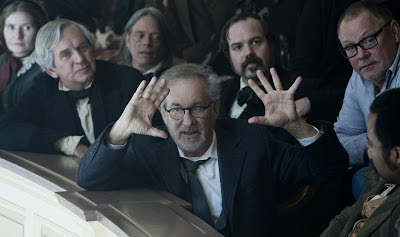To be more specific on how the story is framed, the film deals primarily with the struggle to rally enough supporters to gain a 2/3 majority vote for the bill proposing the amendment in the US House of Representatives. While the Senate had more easily passed the bill earlier, and afterwards it would be ratified among the states, the film takes the stance that the battle in the House was the lynchpin to the process - not only because of the close voting numbers in that governing body, but because of how its passing fit within the political context of the war and the popular opinion across the county. That I can explain this to you is a testament to the clarity with which the story is told - and political dramas can be tough to follow. To be fair, I've read Doris Kearns Goodwin's book Team of Rivals which was Spielberg's main source material for the film. But while true political dramas are more about delivering intrigue, the real summation of the story is an emotional catharsis realized when a set of circumstances and people find success in bringing to pass an historically groundbreaking and life-affirming event.
Spielberg opens with a war scene, set in a muddy riverbed, of hand-to-hand combat from a time before modern military training and hollywood action, where men clumsily, intimately face the reality of giving and receiving death. Awkward hands push faces, men wrestle and reel in the water, bayonets hit and miss their marks. It's a chilling context, necessary to remind us from the start that the ensuing story takes place in a land where Americans have engaged in and felt the effects of such combat for four long years. Politicians and citizens alike are anxious for this unnatural predicament - brother fighting brother - to come to an end. This is just the first of many evidences that this is Spielberg at his best. His quest for historical accuracy is another. Lincoln's study was carefully constructed to match the original down to the wallpaper. The ticking from Lincoln's actual watch was recorded. Spielberg is noted for having now famously come to set in a suit and addressing the lead cast members as Mr. President and Mrs. Lincoln.
Lincoln shows the career arc of a master craftsman for both Steven Spielberg and John Williams. Both gained meteoric success through their collaboration on Jaws (1974) and have been a famous working pair ever since. Their distinct style set the modern standard for high-quality, entertaining, thematic, blockbuster filmmaking and scoring. This film portrays the skill of aged and experienced craftsmen willing to risk taking their art to the next level. As a follower of both their bodies of work I feel Lincoln is a culmination of their skill, thoughtfully matured with a touch that is subtle, slight, refined, and exquisite in its deliberate application that is lastingly powerful. And yes, I did look up "subtle" on thesaurus.com. I've said it before and I'll probably repeat again that artists' best work comes later in their career when they remain dedicated and persistent in the pursuit of the art.
Here's a list of names of people associated with the film, all acclaimed participants in the filmmaking process: Steven Spielberg, Kathleen Kennedy, Janusz Kaminski, John Williams, Ben Burt, Daniel Day Lewis, Sally Field, Joseph Gordon-Levitt, Tommy Lee Jones, James Spader, John Hawkes, David Strathairn, Tim Blake Nelson. Those are just the names that I recognize. More familiar cinephiles, studied hollywood experts, and industry insiders would recognize even more notable members of the cast and crew. I should also mention screenwriter Tony Kushner. His script delivers truthful dialogue that adroitly walks the line of accessibility and accuracy while never making us think we are listening to historical dialogue. I'm excited to see what his next project will be. Drawing from almost an infinite wealth of material on Lincoln, Kushner and Spielberg focus on a time and struggle that help us get to know Lincoln as a man, not just a figure.
Daniel Day Lewis is fully deserving of his recent Best Actor Oscar win for this performance (and he gave one of the most charming acceptance speeches for it). He captures Lincoln's spirit without basing his performance on our standard modern perception of the man (i.e. the voice, the walking gait). Historians will notice Sally Field is almost a full two decades beyond the age of her character but unless you are categorically unable to withstand such inaccuracies, you will be convinced by her portrayal of the tortured Mary Todd Lincoln. Even after reading all of Goodwin's book, it was only Sally Field's performance that opened me to empathize with her character. Tommy Lee Jones is perfectly cast as well. His normal crotchety and closed-in attitude - occasionally a liability for him in that he seems to always play the same character - is an asset here as he plays radical abolitionist Thaddeus Stevens. In fact, it's his character that gives the summation of the film as he comments on the messy, imprecise, precarious process of getting a bill through the House. He calls it "The greatest measure of the Nineteenth Century. Passed by corruption, aided and abetted by the purest man in America."


No comments:
Post a Comment